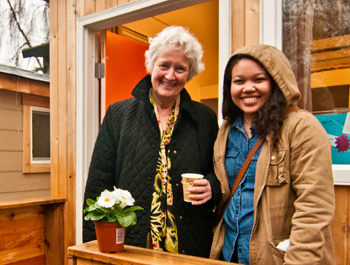Image

Sharon H. Lee, Executive Director, Low Income Housing Institute
Challenge: In November 2015, the number of homeless Seattle residents prompted the city to declare a state of emergency. The shelters were full and the homeless were dying from violence and the dangers of living on the streets. Over 4,500 men, women and children were living without shelter on any given night.
In 2015, homelessness in Seattle reached such a critical mass that the city declared a state of emergency. In response, the city council passed an ordinance to permit up to three tent encampments on city-owned or private property. The Low Income Housing Institute (LIHI) stepped in to help. LIHI established three city-sanctioned tent encampments in partnership with Nickelsville, a self managed eco-village for up to a thousand homeless people, and SHARE, self-managed communities of homeless people. In January 2016, the Tiny House Village for homeless families, couples and singles was opened, the first of its kind in the Seattle area.
LIHI develops, owns and operates affordable housing for a variety of populations, including homeless families, seniors, immigrants, refugees, low-wage workers, young adults and low-income households. LIHI also provides essential services to support those who are unsheltered, including three "urban rest stops," full-service hygiene centers providing free showers, laundry and restrooms. The Tiny House Village is a step in LIHI's spectrum of interventions that can help move people out of homelessness.
The Tiny House Village is located in central Seattle on land owned by the Lutheran Church of the Good Shepherd. The partnership among LIHI, the Lutheran Church, and Nickelsville is vital to the Village's success, as each organization handles different parts of the operation. Among LIHI's contributions is case management to help residents on the path to securing employment and permanent housing.
The Village has 14 tiny houses, a toilet pavilion, a kitchen and dining tent, a security booth and a donation shed. A shower on site is in the works. The Village provides safe housing for homeless individuals and families. The Village was developed as an innovative crisis response to homelessness by moving people into tiny houses instead of tents.
The partnership formed to create the Village extended to pre-apprenticeship programs and vocational schools, which built the tiny houses as part of their curriculum. Volunteer groups formed as well to build the tiny houses. The groups include the Tulalip Tribes TERO Training Program, Apprenticeship and Nontraditional Employment for Women, Renton Technical College, Seattle Vocational Institute, the Wood Technology Center out of the Seattle Colleges, Sawhorse Revolution and the Mercer Island Presbyterian Church.
 The tiny houses are slightly different in design, but they are all safe, sturdy structures that will help protect many of the homeless otherwise forced to sleep on the streets. The houses cost $2,300 in materials and are eight feet by 12 feet in area, about the size of a bedroom. The houses include electricity, ventilation and insulation.
The tiny houses are slightly different in design, but they are all safe, sturdy structures that will help protect many of the homeless otherwise forced to sleep on the streets. The houses cost $2,300 in materials and are eight feet by 12 feet in area, about the size of a bedroom. The houses include electricity, ventilation and insulation.The Tiny House Village has proved to be incredibly successful. Kitty DeBerry, a current Nickelsville resident, believes that the tiny houses are a good alternative for people experiencing homelessness. "Housing, four solid walls and a door that can close out the world, this is an essential need for a person's sense of safety, security and stability. The recent movement seen here in Washington, and throughout the nation, of supplying homeless populations with small housing units in long-term communities, has shown a large ray of hope upon a population that can use all the hope it can find."
The partnership of the Lutheran Church, Nickelsville, LIHI and the volunteer build groups hosted a Tiny House Construction Review event in February, where they discussed lessons learned from this pilot project. Ultimately, LIHI sees tiny house construction as an effective crisis response to ending homelessness. High-quality, but inexpensive, housing can go from planning to move-in in a matter of months. Seattle's Tiny House Village provides an easily replicated blueprint for creating similar homelessness solutions. There are now three such villages in Seattle and we are regularly helping other communities start their own.

